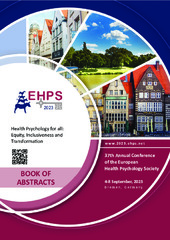Приказ основних података о документу
Why did you do it? Reasons for vaccination and non-vaccination among young adults in Serbia
| dc.creator | Lazić, Aleksandra | |
| dc.creator | Žeželj, Iris | |
| dc.date.accessioned | 2023-09-22T14:47:08Z | |
| dc.date.available | 2023-09-22T14:47:08Z | |
| dc.date.issued | 2023 | |
| dc.identifier.uri | https://2023.ehps.net/wp-content/uploads/2023/09/EHPS_2023_Abstracts_UPLOAD.pdf | |
| dc.identifier.uri | http://reff.f.bg.ac.rs/handle/123456789/4879 | |
| dc.description.abstract | Background: We explored the reasons young people in Serbia give for getting or not getting vaccinated and whether these reasons correspond to the selfish-rational and social norms models of vaccination choices. Methods: 229 participants aged 18–35 (71% women) completed an online survey. In a fictitious disease scenario, n=89 ‘vaccinators’ reported they would definitely/probably get vaccinated, while n=140 ‘nonvaccinators’ would definitely/probably not. They rated a list of reasons for (non-)vaccination (‘completely/somewhat describes my reasons’ indicated endorsement); an open-ended question elicited reasons outside of the two models. Findings: While vaccinators reported not relying on others for protection (46%), non-vaccinators rarely endorsed free-riding (‘many people got vaccinated so I don’t have to’; 19%). What the majority was doing (descriptive norm) was relevant for vaccinators (47%) and they trusted the ‘wisdom of the common man’ (43%); others' behavior was less important for non-vaccinators (25% and 33%, respectively). Weighing personal benefits against risks of vaccination was a common reason for both vaccinators (85%) and non-vaccinators (73%). Vaccinators viewed vaccination as necessary to protect oneself (99%) and others (90%) and as a collective effort to stop the disease (91%). Non-vaccinators believed they did not need vaccination to protect their health (62%). A part of the survey about COVID-19 (n=213) replicated this pattern of results. Discussion: While the reasons stemming from the two theoretical models were less endorsed by non-vaccinators (perhaps due to distrust in vaccine effectiveness), the analysis of open ended responses revealed new reasons (e.g. conspiratorial beliefs). Overall, this study can inform more targeted communication interventions. | sr |
| dc.language.iso | en | sr |
| dc.relation | info:eu-repo/grantAgreement/MESTD/inst-2020/200163/RS// | sr |
| dc.relation | Society for the Psychological Study of Social Issues Researchers in the Global South Grant | sr |
| dc.rights | openAccess | sr |
| dc.rights.uri | https://creativecommons.org/licenses/by/4.0/ | |
| dc.source | 37th Annual Conference of the European Health Psychology Society, 4-8 September | sr |
| dc.subject | vaccination | sr |
| dc.subject | social norms | sr |
| dc.subject | rationality | sr |
| dc.subject | self-interest | sr |
| dc.subject | covid-19 pandemic | sr |
| dc.title | Why did you do it? Reasons for vaccination and non-vaccination among young adults in Serbia | sr |
| dc.type | conferenceObject | sr |
| dc.rights.license | BY | sr |
| dc.identifier.doi | 10.17605/OSF.IO/3RD6Z | |
| dc.identifier.fulltext | http://reff.f.bg.ac.rs/bitstream/id/11900/Lazic_ReasonsForVaccination_Poster.pdf | |
| dc.type.version | publishedVersion | sr |

